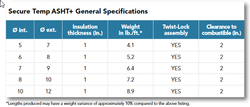I was wondering how consistent the weight of a given chimney model should be. I just purchased some 6" Duravent Duratech. I accurately weighed a 48 inch section of it as being 14.6 pounds. This would be 3.65 pounds per foot. The Duravent website states that this chimney is 5 pounds per foot. That's quite a difference. Do individual sections tend to vary that much? Does anyone think there could be something wrong with my new chimney?
On a related note, the old Chimney that I am replacing is 8" inner diameter, 10 inch outer diameter. It is stainless on both the outer skin and inner liner. It says "Made in Canada" on the top lip of each section. I have both 36 and 24 inch lengths. When I cut one open, it contained a pulpy/powdery fill. It was purchased in 1991 and I am guessing that it may be Security Chimney SecureTemp. I accurately weighed a 36 inch section and it was 27.0 pounds, or 9 lbs per foot. I just looked at the Security website and saw that this Chimney is listed as weighing 7.2 lbs per foot. Could it be that I have misidentified the Chimney model or did this model get lighter in more recent years?
Any information / opinions are appreciated.
On a related note, the old Chimney that I am replacing is 8" inner diameter, 10 inch outer diameter. It is stainless on both the outer skin and inner liner. It says "Made in Canada" on the top lip of each section. I have both 36 and 24 inch lengths. When I cut one open, it contained a pulpy/powdery fill. It was purchased in 1991 and I am guessing that it may be Security Chimney SecureTemp. I accurately weighed a 36 inch section and it was 27.0 pounds, or 9 lbs per foot. I just looked at the Security website and saw that this Chimney is listed as weighing 7.2 lbs per foot. Could it be that I have misidentified the Chimney model or did this model get lighter in more recent years?
Any information / opinions are appreciated.


